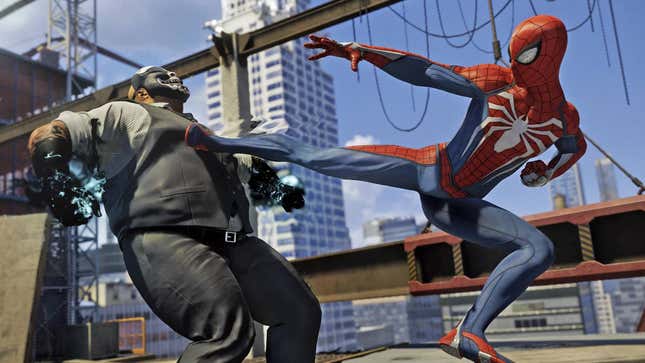
It’s wild to think about a world in which Insomniac didn’t make one of PlayStation’s fastest-selling games of all time, and yet it very nearly happened. After cutting a decade-long partnership with Activision, Marvel Games had been shopping the Spider-Man IP to other major publishers. Taking on an external IP didn’t fit with Microsoft’s business strategy at the time, and they declined. Sony took a gamble by investing in Spider-Man, and it paid off.
As originally spotted by VGC, the book The Ultimate History of Video Games, Volume 2 details how Spider-Man ended up becoming a Sony exclusive. Though Activision had been publishing Spider-Man games for almost 14 years, Jay Ong, the executive vice president of Marvel Games, felt that the publisher wasn’t doing enough with the IP. He noted that The Amazing Spider-Man 2, which had released in 2014, had scored in the 40s on Metacritic.
Ong thought that superhero tie-in games weren’t regarded very highly for most of gaming history: “You judged [superhero games] by a different standard, a lower standard because most superhero games and most licensed games were pretty poor.” As a result, publishers would give studios very conservative budgets for superhero games. The standard changed when Arkham Asylum went on to sell 10 million copies. As a result, Ong decided that it was time to separate from Activision.
The Marvel executive was looking for a publisher that didn’t settle for ‘crappy licensed games’ and could see the IP as a long-term investment. Nintendo was out, since they mostly worked with their own franchises. Xbox “wanted to focus on their own IP.” When Ong approached PlayStation, he sold it to their VPs with: “We could beat Arkham and have one game and maybe multiple games that could drive adoption of your platform.” And that was how Sony would eventually end up staking $100 million on a Marvel game.
They gave the project to a well-regarded independent studio named Insomniac Games. Insomniac had a long track record for technical excellence, and their previous game featured parkour-based gameplay. According to Insomniac’s CEO Ted Price, the studio was the most enthusiastic about Spider-Man. The developers related to how Peter Parker was an “underdog” and an “everyman.” Spider-Man drew favorable comparisons with Arkham Asylum at launch, which had always been Ong’s goal. “Arkham was the one that changed [the low standard] narrative,” he said. “It was inspirational for us in the early days.”